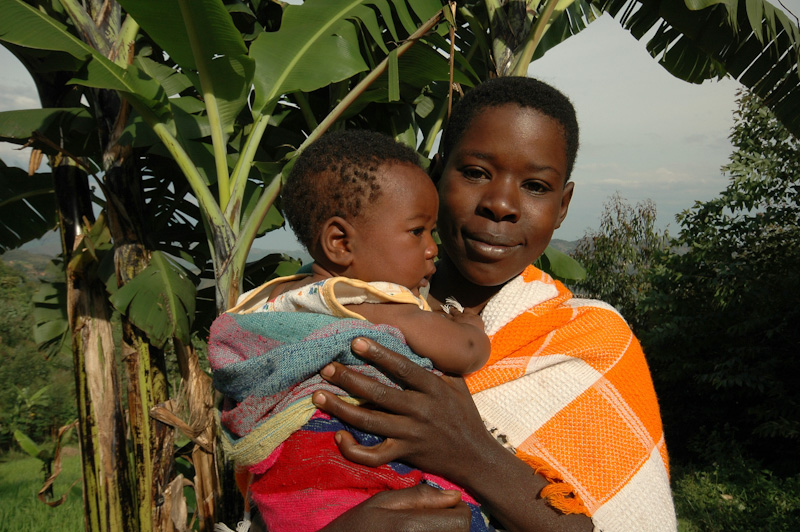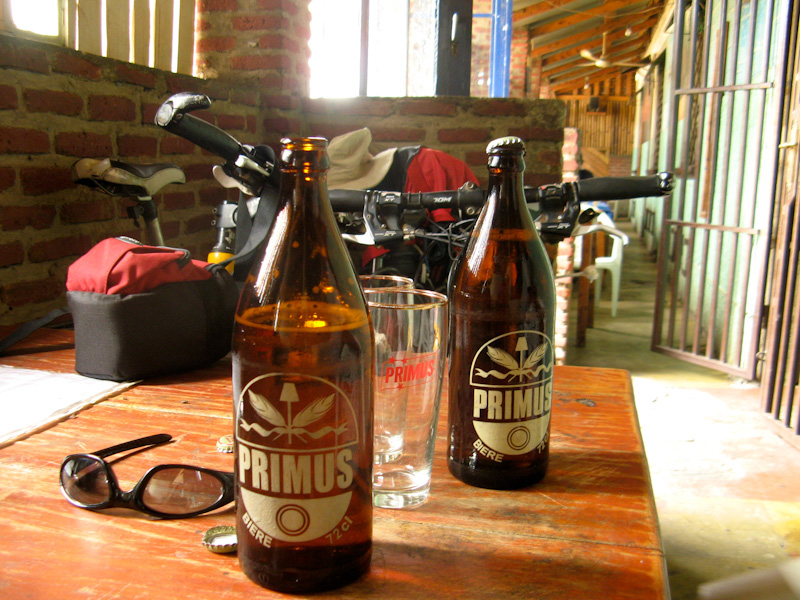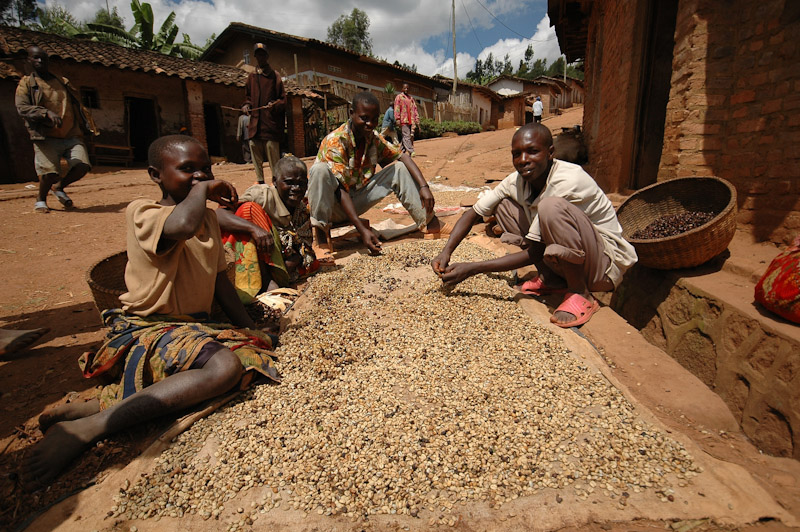Burundi, the heart of Africa

A Hutu tribe woman, Burundi
A scenic river runs along the valley defining the border with Rwanda. Since the outbreak of civil war and even after the official ceasefire, Burundi has a reputation of a very dangerous country. Just a year ago the capital city of Bujumbura was the only area controlled by the state, the rest of the country was ruled by rebels and paramilitary groups. Today, the rebels were disarmed and embodied into the army. Optimistically thinking it means a change for the better.
We pass numerous plantations of coffee and tea before reaching the first Burundian villages. A local small industry, or a field factory of bricks and tiles appears. In this kind of business there is no special treatment for specific age or sex. In fact little girls, just like adult men carry stacks of tiles on their heads.
Burundi is a country of people living modestly. In villages along the way we encounter curious crowds of kids with all their energy trying to keep up with the pace of our bikes yelling umuzungu, umuzungu (in the Kirundi language, white man).
The prices are quite affordable. To my surprise I get 20 packets of peanuts just for one dollar. We stop at a roadside hotel bar in the city of Kayanza. A few minutes after dusk it gets completely dark, as if someone has turned off the lights. That is an African phenomenon. Having ordered a few beers we convince the manager of the hotel to let us pitch a tent inside a conference hall.

A break for a Primus beer, Bujumbura
Some Africans tend to be lazy, however all of them always get up before six. Sometimes probably just to have more time to do nothing.
It is women who are responsible for most of the everyday duties. Firstly, they give birth to children. Every kid spends the first couple of years being carried in colorful robe on its mother back. While the mother every morning grabs a hoe to work hard in a field. If there is a need, they also hand-wash the laundry and tidy up around the hut. In the evening women prepare food for the whole family. The following day at six starts the same day.
Meanwhile, the men are resting around the hut for most of the day. At a certain point of time, assuming everything is already done, they meet up together in a local dive to have banana beer. It is worth to mention that banana beer, besides its low price, tart taste and murky consistency has a specific manufacturing process. This process involves chewing of banana leaves by old women in order to speed up the fermentation .
Men are not that lazy. They often work in the transportation industry. I am impressed by their composure and engagement with which they manhandle their bikes uphill. Often the bikes are overloaded with crates of beer, sacks of onions, beans or cassava. Sometimes a single delivery takes few days. The good thing about it is that stressful deadlines do not exist and timeliness is not required.
Strenuous climbs take many hours every day. Downhill runs are much faster. Cyclists loaded with heavy bags on the trunk rush downhill with the neck breaking speed with no inhibitions. Sometimes these crazy guys can even carry an extra passenger, release the handlebar, look from behind their luggage, greet by waving a hand and smile.
An overloaded truck is slowly, but gradually catching up with us. It has serious difficulties climbing the next hill. Drivers call the boy carrying a case of beers on his trunk to catch up and give them two bottles of Primus beer in an exchange for the empty ones. No problem.
Coffee beans behind the scenes

Drying Burundian coffee
I turn into a side street in a village. The scorching sun in zenith is drying coffee fruit spread on a mat. The production of coffee is laborious process. At this beginning coffee is planted and fruit is collected. After drying in the sun the fruit shells separate from the beans, whose taste at this stage has nothing to do with a taste of coffee as we know it.
Thus obtained grains have pale white color. They need to spend a little more time in the sun. The roasting process (in the traditional way carried out on the hearth) will give the beans brown color and aromatic smell. This is the form in which they are ground to end up in a freshly brewed cup.
Burundians get ridiculously low prices for sale of their coffee, which is then sold for thirty or so times more on convenience store shelves. A twenty-year old guy with whom I talk says: I was born in Burundi, a country of coffee and tea, but I have never tasted any of them. Coffee and tea are entirely earmarked for export, so there is no point trying to find a coffee store in rural Burundi to get an espresso shot.
The chef security officer
We spend a night by the Burundian family in the village of Kibogoye. Shortly after the official invitation, there comes a guy who calls himself the chef security officer of the village. The farce-like meeting starts and seems to continue without end. He is checking our passports, asks to fill out strange looking forms, questions a lot and give digressions. Some time later we discuss current issues and problems of the village.
We ask whether the servants of the law carry machine guns on themselves – the officer responds, “machine guns are no longer in fashion, we use them only to hunt for animals, now there is a trend for classic guns". After two more hours, we hear “Please, feel safe here. You may stay for the night". In the end of the officer explains why it took so long, “you are the first tourists in our village and in my fifteen years of career“.

Transport and trade in roadside Burundi
We are invited to the table. There is rice with a bean and vegetable meal with lightly roasted pili-pili peppers. We sleep on the floor, the apparent lack of mosquitoes makes us forget about the mosquito nets. At night there is a mouse running on the floor for some time, but eventually she also falls asleep.
Bujumbura
We start another day of pedaling at dawn. Always uphill, I am already used to it. A smart way to make road uphill go easier is holding onto a truck, as locals to it. We pass several villages, crowded well and women selling avocadoes and pineapples. We reach the top of plateau. A fantastic descent to Lake Tanganyika starts. I accelerate to an incredible speed, passing many people, overtaking cars and trucks. The only road users able to catch up with me are classically overloaded cyclists who do not obey any speed limits.
Deciduous-coniferous trees are gradually replaced by palm trees. A mild refreshing breeze comes from the second largest lake of Africa. We reach Bujumbura, the capital of Burundi.
The first thing to do is an attempt to extend our visas. Not successful. As it turns out, it will take a few more days.
So we have plenty of time to spend in the capital. The state authorities in the interests of public health designated a one hour every week of compulsory practicing sports. For this reason all the recreation areas are filled with thousands of people running around or playing football.
We grab a Primus beer and sit beside Abdul, a Somali guy to chat with. Town beach is quite a tumultuous place. Nearby a small group of homeless kids play football. They have nothing to do, do not go to school, smoke cigarettes and ask us for a beer. Among these small children barely a few are more than fifteen years old, hence we share peanuts only.
At some point, there is a small argument, which turns into an uncontrollable fist fighting, throwing stones and pouring sand into each other’s eyes. The radius of turmoil is increasing and we are becoming a part of it, so we gradually step aside.
“Doctor Livingstone, I presume?”

Burundian kids nearby Lake Tanganyika
In the morning we receive an extended Burundian visa. Now we need to apply for the Congolese visa. For this reason our stay in the capital will take yet couple of days more. All these formalities cause too much stress.
In the evening we find a well-kept beach, where in a safe distance from the hippos we can swim in the warm water of Lake Tanganyika.
The other day we visit the legendary meeting place of Stanley and Livingstone. At this spot a memorial stone with inscribed date of November 10, 1871 was placed. This is the place where the timeless words “Doctor Livingstone , I presume?” were uttered.
I am going to remember well what I see now. It is a dried up river bed, vast savannah, palm trees and lush vivid green vegetation with the endless waters of Lake Tanganyika in the background. Subtle, but dense fog makes the scenery look like a paradise. You can easily imagine how the legendary meeting of two reputable explorers looked like.
The visas are ready. We’re going towards the Democratic Republic of Congo. Along the way we look at a family of hippos wading in the river Ruzizi, a connection between Lake Tanganyika and Lake Kivu. On the opposite side of the river I discern a herd of Watussi cows with distinctive massive horns.
Some border peddlers emerge selling fruit and stale, yet tasty and caloric flour donuts. After a faster-than-expected a thirty-minutes long customs clearance we leave Burundi.
We follow a narrow strip of road through wetlands covered with dense grass being a perfect natural habitat of tsetse flies and also the main road linking Bujumbura with Uvira, a Congolese city in the eastern part of province Sud Kivu.
Quoting Joseph Conrad, we are right on the way to the Heart of Darkness.
June 2010
[eazyest_folder folder=”2010/burundi”]